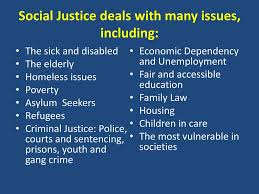Example of Social Justice in Social Work
Social work is a profession dedicated to promoting social change, empowering individuals and communities, and ensuring the well-being of society’s most vulnerable members. At the heart of social work practice lies the principle of social justice, which aims to address systemic inequalities and advocate for fairness and equality for all.
An example of social justice in social work can be seen in efforts to combat homelessness. Homelessness is a complex issue that affects individuals and families across various demographics. Social workers play a crucial role in addressing homelessness by providing support services, advocacy, and resources to help individuals secure stable housing.
Through a social justice lens, social workers not only assist those experiencing homelessness but also work to identify and challenge the root causes of homelessness, such as lack of affordable housing, economic disparities, and systemic barriers. They advocate for policy changes, collaborate with community partners, and raise awareness about the importance of housing as a basic human right.
By addressing homelessness through a social justice framework, social workers strive to create lasting change that promotes equity and dignity for all individuals. This example illustrates how social work practices can embody the principles of social justice by advocating for marginalized populations and working towards a more just and inclusive society.
Exploring Social Justice in Social Work: Key Questions and Examples
- What is social justice in the context of social work?
- How do social workers promote social justice?
- What are some examples of social justice issues in social work?
- Why is social justice important in the field of social work?
- How can social workers address systemic inequalities through a social justice lens?
- What role do advocacy and activism play in promoting social justice within the realm of social work?
What is social justice in the context of social work?
In the context of social work, social justice refers to the fundamental principle that guides the profession’s efforts to address systemic inequalities, promote fairness, and advocate for the rights of marginalized individuals and communities. Social justice in social work involves recognizing and challenging the root causes of social problems such as poverty, discrimination, and oppression. It emphasizes the importance of creating a more equitable society where all individuals have access to resources, opportunities, and support needed to thrive. Social workers strive to empower those who are disadvantaged or marginalized by advocating for policy changes, providing direct services, and promoting social change that fosters inclusivity and equality for all.
How do social workers promote social justice?
Social workers promote social justice through a variety of means, including advocacy, direct service provision, community organizing, and policy development. They work to address systemic inequalities and injustices by advocating for marginalized populations, challenging discriminatory practices, and promoting policies that advance equity and fairness. Social workers empower individuals and communities to advocate for their rights, access resources and services, and participate in decision-making processes that affect their lives. By addressing the root causes of social issues and promoting inclusivity and equality, social workers play a critical role in advancing social justice within society.
What are some examples of social justice issues in social work?
Social work encompasses a wide range of social justice issues that aim to address systemic inequalities and promote fairness and equality in society. Some examples of social justice issues in social work include advocating for LGBTQ+ rights, fighting against racial discrimination, addressing income inequality, supporting immigrants and refugees, combating gender-based violence, promoting disability rights, and working towards environmental justice. Social workers play a crucial role in advocating for marginalized populations, challenging oppressive systems, and striving to create a more equitable and inclusive world for all individuals. By addressing these social justice issues, social workers contribute to building a society that values diversity, respects human rights, and ensures opportunities for all.
Why is social justice important in the field of social work?
In the field of social work, social justice is crucial as it serves as the foundation for addressing systemic inequalities and advocating for fairness and equality for all individuals. Social workers are often at the forefront of supporting marginalized populations and working to dismantle barriers that prevent people from accessing resources and opportunities. By prioritizing social justice in their practice, social workers can challenge oppressive structures, promote inclusivity, and empower those in need to lead fulfilling lives. Ultimately, integrating social justice principles into social work not only helps create a more equitable society but also upholds the profession’s commitment to promoting positive change and advocating for the rights of all individuals.
How can social workers address systemic inequalities through a social justice lens?
Social workers can address systemic inequalities through a social justice lens by actively advocating for policy changes, challenging discriminatory practices, and promoting inclusivity within their practice. By recognizing and acknowledging the root causes of systemic inequalities, social workers can work towards dismantling oppressive structures and advocating for equitable access to resources and opportunities for marginalized populations. Through community organizing, education, and collaboration with diverse stakeholders, social workers can contribute to creating a more just and inclusive society where all individuals have equal rights and opportunities to thrive.
What role do advocacy and activism play in promoting social justice within the realm of social work?
Advocacy and activism play vital roles in promoting social justice within the realm of social work by amplifying the voices of marginalized communities, challenging oppressive systems, and advocating for policy changes that address systemic inequalities. Social workers engaging in advocacy work strive to empower individuals and communities to advocate for their rights and access resources that promote their well-being. Through activism, social workers mobilize collective action to bring about societal change, raise awareness about social injustices, and push for reforms that promote equity and fairness for all. By integrating advocacy and activism into their practice, social workers contribute to advancing social justice principles and creating a more inclusive and equitable society.



